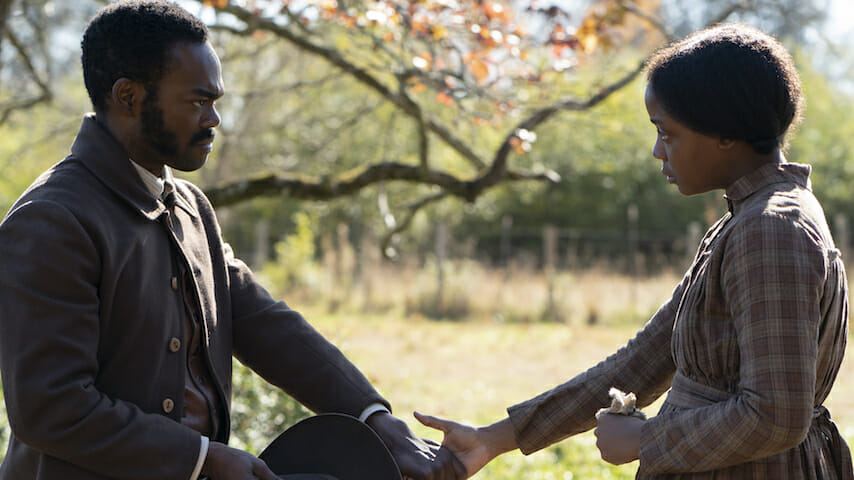The Underground Railroad: Barry Jenkin’s Amazon Series Is a Tense, Atmospheric Exploration of Hope Amid Trauma
Photo Courtesy of Amazon
The Underground Railroad is one of those details from American history that feels like fiction. Though the real Underground Railroad was a network of word-of-mouth abolitionists determined to help slaves escape by opening up their homes instead of an actual secret train, the stories about it always felt larger than life. It was this setting that inspired Colson Whitehead’s bestselling historical fiction novel aptly titled The Underground Railroad, which has been adapted for Amazon Prime.
The 10-episode limited series is a fictional account of two runaway slaves, Cora (Thuso Mbedu) and her partner Caesar (Aaron Pierre), as they traverse the American South via a connection of literal hidden railroads. Helmed by Barry Jenkins, the series is lush and atmospheric while never shying away from the atrocities Cora and Caesar are running from, most notably the persistent slave catcher Ridgeway (Joel Edgerton), who stalks the duo relentlessly.
Each episode plays like a chapter in their journey, one stop on the railroad at a time, and Jenkins is deliberate in his worldbuilding. Georgia and South Carolina and North Carolina feel like different countries with different rules for how to treat Black folk: slaves in one, members of society in another, and illegal to exist in the open in the last. Jenkins fills every location with its own flavors. The first time we see the railroad, it feels like a huge sigh of relief—a literal bright light at the end of the tunnel.
It’s easy for a slavery drama to feel suffocating or paralyzing, and there are parts of The Underground Railroad that are designed to evoke discomfort and stagnancy. For so much of the series Cora is on the run, perpetually looking over her shoulder. Even when she thinks she has found a safe haven and a new community with Caesar, the walls swiftly begin to close in around them. These moments where she can breathe easily feel too good to be true, because in a slave story we are conditioned to brace ourselves for the next blow. And while the blow eventually does come, there is a hopefulness and a fighting energy around Cora.
Much of that can be attributed to Thuso Mbedu’s inhabitation of Cora. In the first episode of the series, we only hear about Cora through other characters, primarily her white owners. She’s a troublemaker and a nuisance, an angry woman who sulks in the corner of a plantation party because her mom escaped without her years ago. (Can you blame her?) But Mbedu is measured in her performance, showing skepticism and fear in one scene while exuding courage and strength in the next. She and Pierre have a tangible chemistry that roots the entire story and makes us believe in their happy ending, even when it feels out of reach.
-

-

-

-

-

-

-

-

-

-

-

-

-

-

-

-

-

-

-

-

-

-

-

-

-

-

-

-

-

-

-

-

-

-

-

-

-

-

-

-








































